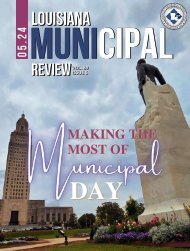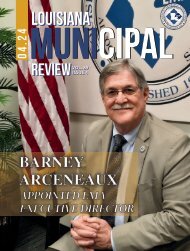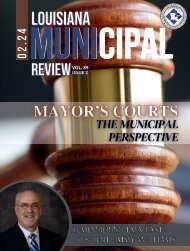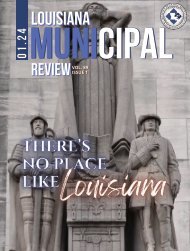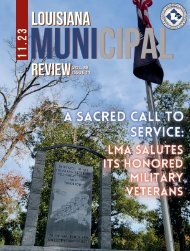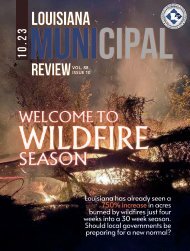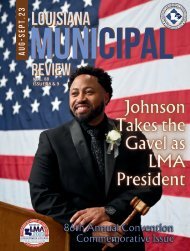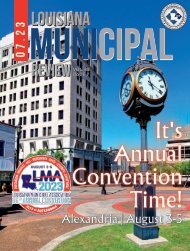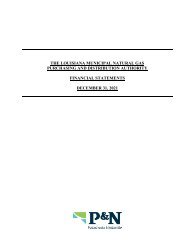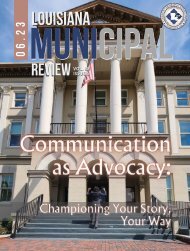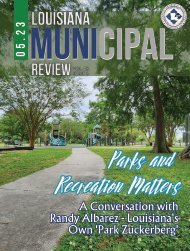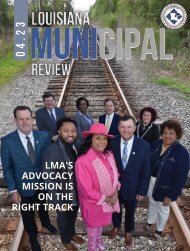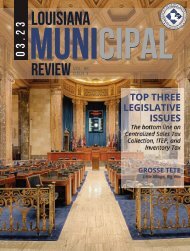You also want an ePaper? Increase the reach of your titles
YUMPU automatically turns print PDFs into web optimized ePapers that Google loves.
Preparing for and Responding to Hurricane Laura
and Other Disasters During the COVID-19 Pandemic
BY BRETT KRIGER, LMA DEPUTY DIRECTOR OF DISASTER RESPONSE
Louisiana municipalities are facing two
serious threats: Hurricane Laura and the
COVID-19 pandemic. How do leaders
and professionals in healthcare, public
health, and emergency management
cope with this combined challenge to
protect people in the communities they
serve as they face multiple, complex
disasters and emergencies at the same
time?
Planning for tropical storms, hurricanes and other potential
disasters is stressful and difficult even in normal times. Because
the 2020 hurricane season comes during the coronavirus
(COVID-19) pandemic, the preparedness, response,
and recovery process goes from difficult and challenging to
practically overwhelming.
Our public health
and emergency response
professionals
have provided
advice to help
municipal officials
safely prepare, evacuate,
and shelter
for severe storms
that can help you
protect yourself
and others from
COVID-19. Our
friends, family, and
neighbors in the
western part of the state are already facing the complexity
of surviving the aftermath of Hurricane Laura when shelter,
hotels, electricity, food, and water are all in short supply.
The COVID 19 threat even makes it difficult for responders,
utility workers, debris removal teams, and FEMA to get help
into the disaster zone. The shortage of safe operating, living,
and staging locations for all those critical workers is a daunting
challenge.
Limited Shelter for Evacuees
“Our small town of DeQuincy was hit
by Hurricane Laura to the point of
devastation. However, by the Grace
of God, hard-working employees,
great citizens working together, and
volunteers from all over the US, we
are making progress toward restoration.
We may have a small town,
but we have BIG Hearts and those
hearts are shining bright during
these dark days.”
- Mayor Riley Smith, DeQuincy
FEMA will adjust polices to allow state and local officials
to execute non-congregate sheltering in the initial days of
an incident. Non-congregate shelters include, but are not
limited to, hotels, motels, and dormitories. FEMA Regional
Administrators have delegated authority to approve requests
for non-congregate sheltering for hurricane-specific disasters
for the 2020 season. While not a single solution, this funding
will assist with sheltering
operations in
the short-term.
The severe limitations
on shelters
being opened for
evacuees from
Hurricane Laura risk
areas and nursing
homes led many
to plan for staying
with friends or family.
That is a great
option if you have
that opportunity
but if you will be
staying with friends
or family outside
your household to
evacuate from the storm:
“Pineville is accustomed to being a
place of refuge for those impacted
by hurricanes but this time we are
the ones being impacted. We’ve
seen tremendous efforts by our
public works crews and public
safety employees to maintain city
services and keep our citizens safe.
We’re especially thankful for Cleco
and their many supporting contractors
from 16 other states who are
restoring power to our region, including
roughly half our city. As we
move forward into this recovery let
us continue to work together until
all of our citizens are fully restored."
- Mayor Clarence Fields, Pineville
• Talk to the people you plan to stay with about how you
can all best protect yourselves from COVID-19.
• Consider if either of your households has someone
who is at higher risk of developing severe illness from
COVID-19, including older adults or people of any age
who have underlying medical conditions. Make sure
everyone knows what they can do to keep them safe
from COVID-19.
• Follow everyday preventive actions, including covering
coughs and sneezes, washing your hands often, and
avoiding touching your eyes, nose, and mouth with
unwashed hands. Consider taking extra precautions for
Page 20
LMR | SEPTEMBER 2020



